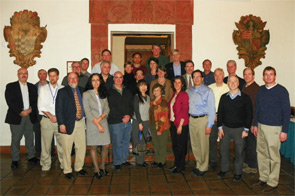
Two recent meetings supported by the ACR Research and Education Foundation (REF) provided investigators in disease-targeted research initiatives the opportunity to present on their progress and build collaborations.
The 2012 ACR REF Disease-Targeted Research Investigators’ Meeting took place in Santa Fe, N.M, on January 18–19, 2012. The scientific meeting featured 36 researchers from academia across the country, including representatives from the National Institutes of Health and the Arthritis Foundation.
Sonye Danoff, MD, PhD, and Ted Mikuls, MD, MSPH, were among the researchers presenting at the meeting. Dr. Danoff, an assistant professor of medicine at Johns Hopkins University in Baltimore, is studying better techniques for detecting interstitial lung disease in patients with rheumatoid arthritis (RA) and determining if treatment is successful.
“Over the past decade, there have been dramatic advances in the treatment of joint disease in rheumatoid arthritis,” says Dr. Danoff. “However, there remain important extraarticular manifestations of RA that impact patient morbidity and mortality. Among these, RA-associated interstitial lung disease appears to be an increasing cause of death in RA even as overall RA-associated mortality rates decline.”
According to Dr. Danoff, whose project received funding from the REF beginning in 2010, the techniques can be easily incorporated into clinical practice and will improve treatment of patients with this life-threatening complication of RA.
“Our goal in the project is to develop improved methods to detect and quantify early interstitial lung disease prior to the onset of symptoms and to use these methods to determine biomarkers that predict increased lifetime risk of ILD for patients with RA,” she says. “Developing such methods for prediction and quantification of early ILD are critical in the pathway to identifying effective therapies for this disease.”
Dr. Mikuls, a 2010 REF grant recipient and rheumatologist from the University of Nebraska Medical Center in Omaha, provided crucial insight into the interrelationship of periodontal disease (PD) and RA.
“Our research is focused on the associations of periodontitis and infections leading to periodontitis with the risk and progression of rheumatoid arthritis,” Dr. Mikuls says. “We believe that this may provide novel and important insight into rheumatoid arthritis pathogenesis and hopefully an avenue for the treatment and prevention of this disease.” Dr. Mikuls’ study will show for the first time that the association of PD with RA risk and progression is mediated through oral infection with P. Gingivalis, a risk that will be most pronounced in individuals with select genetic risk factors for RA.
Also supported by the REF and held in conjunction with this year’s REF investigators’ meeting was the Keystone Symposia Meeting on Rheumatoid Arthritis.
About 20 REF-funded investigators presented their research at the Keystone Symposia Meeting, which provided an opportunity to share cutting-edge research with experts and leaders in the field of RA research.
“It’s exciting how far the REF’s disease-targeted research program has come in just five years,” says Gary S. Firestein, MD, professor of medicine and dean and associate vice chancellor of translational medicine at the University of California San Diego and one of the organizers of the meeting. “Collaboration has played a vital role in that success, and it will only become more important in the future. That’s why it is essential to bring diverse investigators together in a way that fosters cooperative efforts.”
For additional information regarding the REF Investigators’ meeting, contact [email protected].